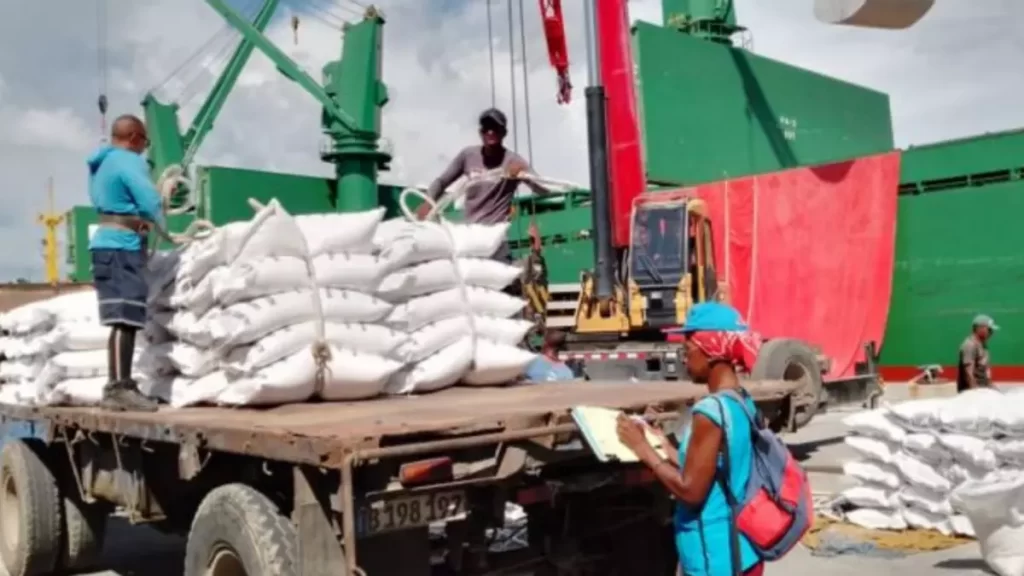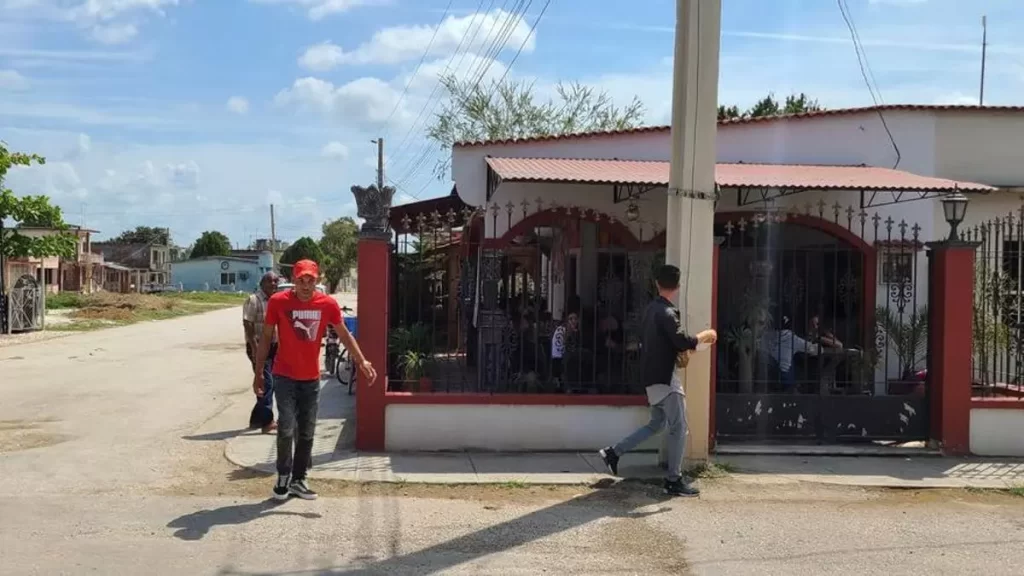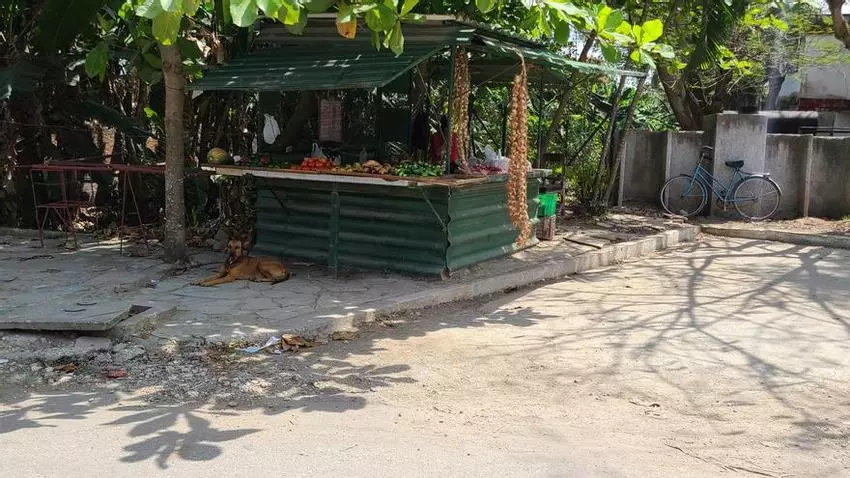The second edition of the program “Hello, President” hit the target by addressing the main concerns of citizens, as the leader said: the fuel seven days ago, and yesterday the basic family basket, sold through the rationing system.
The background is different for each. If last week the issue of energy ended up leading to the alleged responsibility of the United States in the promotion of the March 17th (’17M’) protests, this Thursday it went from the lack of coffee to the alleged effects that Washington’s “financial persecution” has on a basic basic basket that continues to die, but without a death certificate. continue reading
Yesterday’s program revealed that at least until June, the products are being negotiated for all Cubans on the Island
Díaz-Canel, an optimist, said that some provinces have good indicators in food production, and he cited the bean in Cienfuegos as an example. He added that “we will be moving to a fairer distribution system, where we focus on the fundamentals of the basket subsidized to people who are most disadvantaged (…) guaranteeing not a subsidy to products but a subsidy to people.”
This mantra has been repeated since 2012, when Raúl Castro pronounced it as an objective of the State and, despite the fact that last December Prime Minister Manuel Marrero resumed it when — without pronouncing the end of the universal ration book — it was announced on yesterday’s program that at least until June, the products for all Cubans on the Island are being negotiated.
The president-presenter briefly summarized the situation of the basket, about which, he admitted, the population has a “very negative” opinion. The problems are four, he said: the “fractionation” (more colloquially, the constant lack of products), the quality (bad), the composition (increasingly leaner) and how to ensure it. In addition, he opened with a commitment that April and May will be better than the last months of 2023 and early 2024, although the population no longer remembers the time before the basket began to be almost a specter.
The ministers – Betsy Díaz Velázquez of Internal Commerce, also participated in the talk – offered some data, such as the $230 million per month that it costs to supply the country’s 12,000 ration stores. Above all, it was a tedious and detailed inventory of missing or present products. There was talk of salt, eggs, flour, coffee, peas, milk, and of one province after another, including delays and forecasts.
But the most interesting part was the arguments to explain Cuba’s inability to buy: the energy and financial crises and Washington’s sanctions. “This morning, when we were analyzing the situation of the basic basket, we had 11 ships with food in Cuban ports that, for financial reasons, we had not been able to start unloading, and we began unloading in the last hours from the decisions that were made,” Pérez-Oliva explained.
Last year there were “five banks that, without prior notice, refused to process transactions related to food purchases destined for the basic basket”
The official wanted to give a “specific example” and explained that last year there were “five banks that, without prior notice, refused to process transactions related to purchases of food destined for the basic basket,” which generated delays of between 40 and 105 days for the shipment to take place, conditioning the arrival at port and, therefore, its distribution. He did not say, despite his declared intention to specify, which banks refused or what amounts were paralyzed, nor from which countries the imported products came.
The deputy minister regretted that Washington denies that there is a “blockade” because of the mere fact that there are American companies that sell food to Cuba. “The conditions in which we agree to buy food in the United States are, first of all, disadvantageous and highly insecure,” he explained.
Pérez-Oliva argued that suppliers and shipowners must request exemption from the Office of Foreign Assets Control (Ofac) in Washington, which, in his opinion, is discretionary, so Havana always has to have a plan B. Although it is cheaper to buy from the United States, the transaction does not always happen, which adds costs to the delay. In addition, the ships have to return empty, which makes freight more expensive.
“For relocating products that, if purchased in the United States, would mean a lower cost, the country has had to pay an additional 19 million dollars in 2023. If we take that in terms of product, it means four months of distribution of chicken from the basic basket to the population,” he explained, while making it very clear that it is the direct will of the White House, since there are many entrepreneurs interested in selling under the usual conditions of the international market.
In his explanations, the official concealed that many shipping companies schedule stopovers in several countries to distribute their merchandise, which eliminates the obligation to return empty to the United States. In addition, he ignored the case of the Tunisian oil tanker Eco Fleet that has been turning in circles in front of the port of Havana for more than a month, perhaps waiting for payment to unload the 260,000 barrels of diesel it carries.
“What will be the reaction in our population to the explanation we have been giving? We will be attentive to the concerns, to the doubts that may still remain.”
The dependence on gifts was also confirmed when the participants thanked “friendly countries of the Caribbean, China, Vietnam and Russia,” for having responded with a “strengthening of solidarity” to the “media movement” made against Cuba. They referred to the information, revealed by the EFE agency initially, of the urgent request for milk to the World Food Program (WFP), which according to the regime is “part of all that intoxication and demonstrates the perversity, the evil that there is with such sensitive things. It’s about setting the population against the Government.” The aforementioned countries have faced this “attack” to collaborate with “deliveries of products, either with favorable financial conditions or through donations,” he said.
The Chinese rice was cited as an example. The first delivery of the six planned arrived this Thursday, and the amount will be increased next month, for a total of nine pounds. That mention also gave rise to the guarantee of the arrival of flour that, if it is possible to pay a pending freight, will disembark this Monday. It will soon be joined by three ships loaded with wheat, which “allows the production” of bread to be revitalized.
Díaz-Canel also pointed out the importance of changing the energy matrix and announced that during the inauguration of the International Transport Fair he saw an electric vehicle of national development – the result of the joint work of the Ministry of Industries and the military. This “type of van” will contribute to the distribution of the basic family basket within the provinces. It will not solve, he said, interprovincial transport, but it will solve the shorter transfers, which would reduce fuel consumption.
“How will the population react to the explanation we have been giving? We will be attentive to the concerns, to the doubts that may still remain,” the president said. And they have not taken long to reach him, through the official press, some thanking the efforts and explanations, others suggesting more control over the high prices of the private companies and many testifying that the products do not end up appearing. “Very good speech, but they always tell us that the products are assured for a certain time, and they aren’t. Perhaps they are assured in an economic plan, but it seems that almost none of those products is physically in the country.”
Translated by Regina Anavy
____________
COLLABORATE WITH OUR WORK: The 14ymedio team is committed to practicing serious journalism that reflects Cuba’s reality in all its depth. Thank you for joining us on this long journey. We invite you to continue supporting us by becoming a member of 14ymedio now. Together we can continue transforming journalism in Cuba.

![]() 14ymedio, Juan Matos, Manzanillo, 24 March 2024 — It is five in the afternoon at the Manzanillo bus terminal stop, in the province of Granma, and people can’t take it anymore. The heat is around 33 degrees (91F) and the packages – almost everyone carries a basket or sack – will be the most difficult thing to get onto the truck that has just arrived. Slowly, with a white and green casing, and a strong stench of diesel, the vehicle parks and opens its hatch.
14ymedio, Juan Matos, Manzanillo, 24 March 2024 — It is five in the afternoon at the Manzanillo bus terminal stop, in the province of Granma, and people can’t take it anymore. The heat is around 33 degrees (91F) and the packages – almost everyone carries a basket or sack – will be the most difficult thing to get onto the truck that has just arrived. Slowly, with a white and green casing, and a strong stench of diesel, the vehicle parks and opens its hatch.


















